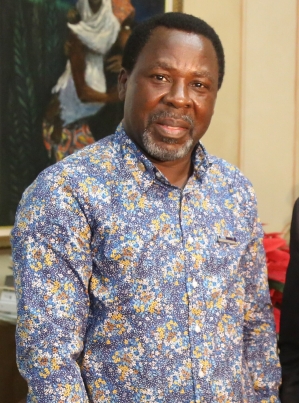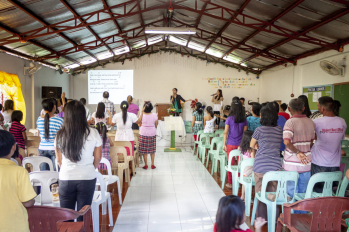
The recent expose by the BBC on the late prophet T. B. Joshua is heart rending. The reports and eyewitness accounts point to what is without a doubt a massive tragedy on many levels. To witness someone in authority in a church be able to perpetuate so much abuse for so long with complete impunity makes your blood boil. To see the lives of so many people scarred, perhaps for the rest of their lives, cuts to the heart. It puts on full display the ugliness of sin or evil and its power to hide and grow. It should make us all long ever more eagerly for the day of our Lord’s return to judge every lawbreaker and to make all things new.
However, to my mind, one of the greatest tragedies from this saga is that countless similar scandals have happened before in the African church. More so, they’re almost certainly going to happen again. Soon. Recently, there was a pastor starving his people to death in Kenya. Before that, it was another commanding his flock to eat grass in South Africa. The only question is who will be the next pastor to be unveiled as a monster, and in which country it’ll happen?
The African church has a massive church governance problem.
What makes me so certain? Is it that I wish evil on the African church? God forbid! However, I expect these evils to reoccur because the African church has a massive church governance problem. This is how T. B. Joshua was able to get away with such evil for so long. Only, no one seems to be talking about this problem, which allows pastoral sins to remain hidden and metastasise. It’s a problem across the continent.
Church governance means instituting and implementing a set of rules and procedures that ensures that people in church offices can perform their functions effectively, but are simultaneously prevented from abusing their office or power. And it matters much more than most of us realise.
The Problem in Many African ChurchesIn Africa, broadly speaking, there are three types of churches.
Firstly, there are those that were started by western missionaries, and which are now led by Africans. In West Africa these are typically called ‘orthodox churches.’ Secondly, there are those that were started by Africans, but whose founders have now died leaving behind an institutional form of church leadership. Finally, we have those that are led by founder pastors who are running their churches like a personal fiefdom, without setting in place any strong institutional structures that limits their powers and holds them accountable to members.
In my experience in Nigeria, most of our churches have church governance problems. But these problems are most exaggerated in the 3rd type of church above. Churches that are run by a founder pastor, like the Synagogue Church of All Nations.
This indigenous recipe of church government we’ve cooked up is a pot of poison.
The average founder is an entrepreneur who has by dint of hard work and leadership talent built up the institution he leads. Typically, such men (or women) have little or no theological training, which they treat as a badge of honour. The church would be run as a one-man business, where the founder is simultaneously a kind of Pope (with ex cathedra like authority); an American type CEO using business principles to run the church; and a traditional African style chief, who is a unquestionable parental figure to his or her congregants (for example, T. B. Joshua demanded to be called “daddy”). This indigenous recipe of church government we’ve cooked up is a pot of poison that is killing us.
Even the Apostle Peter Was AccountableDear reader, ask yourself if your church leader is accountable to anyone, within or outside your church? Can your pastor be easily contacted by any church member who has a concern? Is there a clear process for reporting abuse by those in authority in your church? Is there any procedure for removing your pastor from office if he fails? If you are struggling to answer these questions, then know for sure that your church is not running a biblical church model.
The apostle Peter had to publicly address ordinary church members’ concerns.
Consider how the early church was run. An example can be found in Acts 11:2-4. After he’d travelled up to Jerusalem, some of the Jews criticise and question Peter. But instead of denying them any right to speak against him, he explains himself. He gives an account, so that “when they heard these things they fell silent. And they glorified God” (Acts 11:8). Here we see that even Peter, the foremost of the apostles of Jesus Christ, was able to be questioned by ordinary church members and he had to publicly address their concerns until the church was satisfied. Can we see this kind of process in the churches in Africa?
Similarly, in Galatians 2 Paul recounts how he rebuked Peter. Shockingly, perhaps, for those who’ve sat under pastors and prophets like T. B. Joshua, the apostle repented. That is, even Peter was not above reproach or corruption. He was accountable to others.
Avoid Churches Without Good GovernanceBut when we study the tragedy of T. B. Joshua, we see all these dangerous marks I’ve highlighted above, rather than what we read in the New Testament.
As the BBC reports, disciples were forbidden to sleep for more than a few hours at a time. Joshua prohibited them from using their own phones or having access to personal (and private) emails. He forced them to call him “daddy.” Another article has an eyewitness saying that T. B. Joshua wanted to control everybody. And everything. These are all massive warning signs of unbiblical church governance.
Brothers and sisters, our pastors are not gods. Nor are they mediators between us and God (1 Timothy 2:5). They are fellow, frail and sinful men like us.
For the sake of their own souls and the lives of the people they lead, we must insist on biblical church governance. We have to hold them accountable. If your church doesn’t have clear church governance, your membership there means that you’re helping perpetuate an unbiblical system that can lead to abuses of the worst kind. Paul’s warning to Timothy is relevant to you: do not take part in the sins of others (1 Timothy 5:22).
As my father used to say, in Yoruba: Abo oro ni a nso fun omoluwabi, to ba de inu e a di odindi. That translates loosely as: “To a wise child, you only need to speak half a word, if they reflect on it and take it in, it will become whole inside them.”
Oyewole Akande serves as a deacon at Sovereign Grace Bible Church, Lagos, Nigeria. His greatest desire is that Africa will be filled with the knowledge of the glory of the LORD as the waters cover the sea. He is married to Evelyn and is father to Dara, Layo, Fewa, and Eri. Oyewole also contributes to the blog: Practical Christianity.
This opinion article was originally published by The Gospel Coalition Africa (TGC Africa). It was republished with permission.





